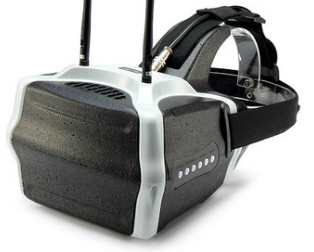
Updated 2/23/2014
Frequency to use:
In general, lower the frequency, longer the range. Higher the frequency, smaller
the antenna.
900mhz is great because of long distance and can bend around object as well
as fly behind objects. But only large transmitter avilable.
1.2Ghz is good frequency, but if using 2.4Ghz receiver like the Walkera, then
need a filter next to the Rx that adds weight.
2.4Ghz video is not good with 2.4Ghz radio. Helicopter will crash for sure.
Only save 2.4Ghz radio to use with 2.4Ghz video is Futaba Fasst radio.
5.8Ghz does come in micro compoents. However, cannot go behind objects since
radio wave only go in straight line. Tend to bounc off too many objects and
create noise for the receiver. Range is only 300' max if not using a circular
clover leaf antenna. Always use circular antenna on 5.8Ghz. Make sure antenna
is pointed up, and not sideways.
Compatibility:
Fatshark and ImmersionRC transmitter not compatible with chinese brand transmitter.
Fatshark frequency end in 0. ie: 5.820Ghz while others system's frequency end
in 5. ie 5.825Ghz. Also, Fatshart and Immersion use different
modulation type, and will not work with others at long distance. Check frequency
before buying any individual components.
Signal Format Compatibility: NTSC and PAL at this point are interchangeable. Resolution is also interchangeable. Pictures will get stretched if the aspect ration does not match, but they are all compatible because the signal is analog.
Others:
-Masure sure all components have the proper voltage. Cameras can require anywhere
from 3.3V (Desirable) to 6V, or 12V. If is 12V, you either have to have a battery
pack in series or use a voltage booster.
-For cameras, CCD is a better choice than CMOS. CCD does not have the jello
effect, also called the rolling shutter where output is read one line at a time.
CCD read all the lines at the same time, so you get a non-distorted picture.
You can see on some youtube video where the camera points thru the propeller
that the propeller becomes strange lines. See this
at 0:21. Down side is CCD cameras typically requires more power, and run at
higher voltage.
Antenna:
For 5.8GHz, the antenna to use is circular
polarized antenna. You get a better picture, and longer range with it. There
are mainly two types of circular polarized antenna. Clover leaf and Skew-Planar
Wheel. The difference between the two is that Clover leaf antenna has 3 leafs
while the Skew-Planar antenna has 4. The Skew-Planar can be used on both the
transmitter and receiver. The Clover leaf should only be used on the transmitter.
Since the clover leaf antenna only has 3 leafs, is best to be used on the transmitter
since is lighter.
One more important point is both antenna comes either with right hand circular
polarized or left hand circular polarized. Be sure the transmit and receiver
have the right polarization. Otherwise, you get a 30db
drop in signal. If you don't have the right and left hand match, is better
to just use a linear antenna. At least the drop is only 3db.
Box goggle vs FatShark type. What is box goggle? This is dorky looking goggle that looks like you are wearing a box on your head. Why box goggle? They are cheaper and easier to design and manufacture so you get greater field of view as well as higher resolution for lower price. Why get the FatShark type google? At this point, is only the looks.
FPV goggles typically comes with receiver as well as headtracker. Headtracker
output can be connected to the transmitter to point the camera on the airplane
as your head move. See radio section below for compatibility with radio. Down
side of FPV goggles are that you get poor picture quality for the price. Use
multimedia goggles for high definition viewing. However, these are really home
theater glass, so you will need a separate ground station receiver along with
cables and separate head tracking device. Will need high definition camera as
well to take advantage of the increased resolution. They are great if you are
really into FPV.
For goggles, some people like smaller FOV (field of view). Others like larger.
If FOV is too large, you can't read some of the OSD characters if you are using
OSD. Larger fov seems more natural.
Skyzone SJ-V01 - 1280x800 HD. High 72 deg FOV. For $189, Fatshark cannot touch the quality, resolution or FOV of this google. Fatshark just as well be out of business.

Eachine Google - 1080p $139. Lower resolution than Skyzone above. Look about just as dorky, but still blows Fatshark goggles out of the water.
Fatshark
- Most popular. Has their own frequency and modulation. Not fully compatible
with other systems.
Predator V2 - $319 Has NexwaveRF technology 5.8Ghz receiver
build in. Only 25deg FOV. No headtracking.
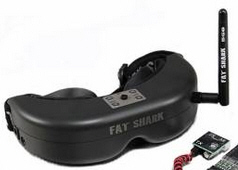
Base - $260 - Large 35deg FOV. No build in receiver.
Need ground station receiver. No headtracking.
Dominator - $400 Better optics with glass, and modular. 35deg FOV V2
has DVR to record video. Does not include receiver or head tracker. Head tracker
$119.
Separate NexwaveRF module
$44 . 640x480 with 720x480 HDMI support. Will be expensive once all components
are added in.
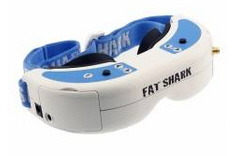
Attitude - $430 Plastic lens, but image almost as good. Larger
35deg field of view. Build in headtracker and receiver, cannot be updated. V2
version has NexwaveRF for better reception. 640x480 CE version has transmitter
with 2X
range as FCC version. Both has desirable circular antenna. Basic version only
has linear antenna, but with 250mW transmitter. FCC is legal in US. CE and basic
probably not.
Dominator HD - $580 Large 45 deg FOV and high 800x600 resolution.
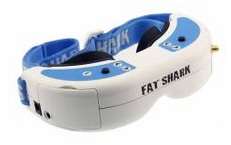
Skyzone Goggles $409 Sold by Foxtech.
, HobbyWireless and ReadyMadeRC
Great 854x480 resolution. 5.8GHz Can operate on Walkera, Fatshark and other
frequencies, but for Fatshark, modulation may be different, and officially,
may not work at long distance. One user found this to receive Fatshark transmitter
even
better. It will stretch the Fatshark picture due to different aspect ratio.
30 deg FOV
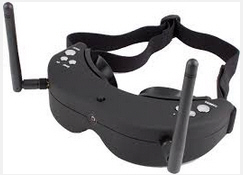
Walkera
Pro FPV goggles $449 very expensive. Operates on 5.8Ghz, but not
compatible with Fatshark.
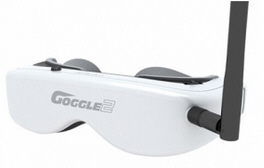
Boscam - Has dual 2.4Ghz
and 5.8Ghz frequency. Frequency not compatible with Fatshark or Walkera. For
generic transmitters.
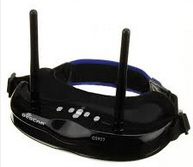
Multimedia Glass - Need ground station, but blows away any of the above
FPV glasses for picture quality.
Zeiss
Cinemizer $789 OLED glasses - For FPV with ground station.
Vuzix. $440
Half the price of Zeiss, but without the well known optics.
Headplay
Sold by Range Video - High resolution, but no build in receiver - need ground
station.
Head Tracking - Add a better head tracker to the goggle than what is on there. Headtracker on googles are not very good.
How to connect a head tracker to the radio: List of recommended radio.
Most people use 2.4Ghz radio now adays. However, if you are into long range
FPV, older 72Mhz radio may have longer range.
What 72MHz radio
to use. Most likely, these will have to come from ebay. They are not made anymore.
Easiest All in One Camera/Transmitter for Micro RC:
Spektrum Option:
Ultra
Micro FPV VA1100 Transmitter/Camera unit. Buy as a package with
Teleporter
V4 Video Headset
The V4 goggle in the combination package is poor quality. Only 320x240 resolution.
However, Spektrum made it a vitrual
head tracking. Camera resolution is 640x480, therefore, the view pans around
the camera frame. Camera itself does not really move, but has an illusion of
head tracking for a few degrees.
Good news is camera should be compatible
with every headset Fat Shark makes. Get a better quality headset by buying separate.
Consider
using Attitude V2 or Dominator V2 instead of the stock goggle. Attitude
V2 or Dominator V2 has higher 680x480 resolution. Even better is Skyzone that
has 854x480 resolution. Allows for upgrade latter on. For the receiver, the
antenna needed is a spironet Right Hand Circular Polarity. Antennas comes with
right or left hand, for this VA1100, right hand is needed.
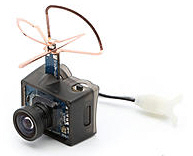
Walkera Option:
Walkera TX5805
Get a with lens a "D " from a 808 16 keychain camera, and homemade
antenna. Note that Walkera camera is not compatible with Spektrum or Fatshark
goggles. Use Walkera or Skyzone
goggles.
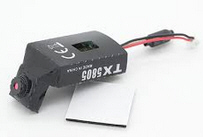
Boscam Option:
Get the Boscam CM205 camera. It is
tested to be better than the Spektrum for way less money. Only $25!
Note that this camera will NOT work with Fat Shark. Need Boscam or Skyzone headset.
Only down side is 10g weight versus 4.5g for Spektrum. However, if you manage
to take off the housing, it may be lighter.
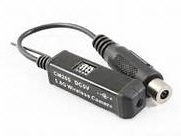
Solder Your Own Components Option - More flexibility,
and easier upgrades:
You will need from below camera, transmitter, an antenna and if necessary voltage
regulator/booster.
Reference:
Here is an older post for reference.RCGroup.
How to solder your
own micro FPV receiver.
Components List:
Video camera:
Range video micro
camera. CMOS camera. 2g. Option of 3-5V or 4.4-12V
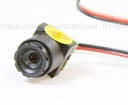
FPVHobby 1 gram
camera. Goes great with wide
angle lens. CMOS camera. 3.2-5V

0.008Lux
520TVL Mini CCTV Camera. CMOS camera. 1g 3.3-6V

Camera lens can be changed. Use a CCD camera lens. They are
all compatible with same sensor size camera.
Larger Video Camera (Not micro anymore, but better performance):
600TVL
5-22V 70mA draw. 600TVL resolution. Not as good. Sony 800TVL
- Great low light performance and very good dynamic range. Require 6-16V 90mA
draw. 800TVL resolution. Not really a micro camera, but heavier. Best thing
is this is a CCD camera.

RunCam HD: This should offer the best performance, but at 41g is bigger than micro helicopter can handle.
Transmitter:
(Be sure to check frequency compatibility and operating voltage)
Rangevideo
200mW 2g 5V operation: 200mW is pretty high power, and will drain a small battery
fast.
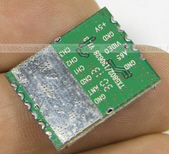
FPV
hobby one is 25mW 1S operation 1.9g only, and comes with antenna. Variable
10mW to 100MW. Good thing is this comes with an antenna. 3.5-5V operation.
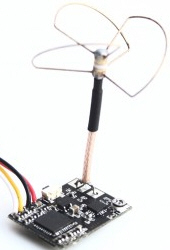
AltitudeRC
Nano 25mw. 1S operation, 3g. 3.4-12.6V Has 3.6V output for camera.

This Immersion
one is bigger, but has 5V supply for camera. 25mW Require 2S to 6S for power.
Can run larger Sony cameras.
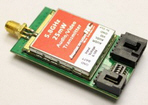
Antenna:
(Be sure you match left or right polarized antenna)
Ready
Made RC:
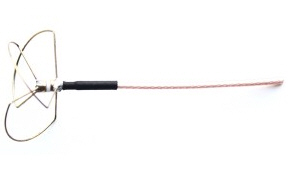
Voltage Regulator:
(Camera or transmitter may be different voltage than battery)
FPV hobby 5V output regulator.
Micro voltage regulator: Link
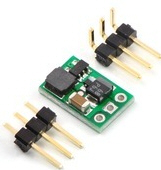
Connectors:
http://www.partco.biz/verkkokauppa/i...h=23_1921_1583
Storm racing drone. Small size 4" propeller (Less likely to draw attention) High quality Runcam camera.
The Big 4:
US Based
ReadyMadeRC - US company with full range of FPV gear.
Range Video- US companyAlso has micro 5.8GHz tx. tx and rx together here is only $50. RX is dual output. Can use one for recording. Camera are larger, and more expensive- $50. Tx not compatible with fatshark goggles with build in Rx (Different frequency). Has Headplay 800x400 FPV goggles.
Oversea
FPVhobby.com - They are in Istanbul Turkey, but has great selection of micro camera and receiver - Note: . Micro camera/receiver
foxtechfpv.com - Based in Hong Kong - Has Tx , RX & AIO goggles with buildin RX. Very small FH10C camera with case 1.6g for $45. Has larger zoom camera also. 5.8G 200mw transmitter @1g $20. 5.8G receiver dual output $26.
Getfpv - In US
Others:
US Based
hobbywireless -Based in US Has goggles: AIO, fatshark,vision 3D. 3g camera $59 55deg fov.
DPCav.com - USA based company -Racewood-900mhz, Lawmate 1.2ghz in standard size. Also Airwave (5.8Ghz) that looks to be micro transmitter, but no weight. - Airwave 5.8Ghz Tx is compatible only with Airwave and Fatshark goggles (Different frequency that ends in 0 instead of standard 5). Standard frequency 5.8ghz rx $45 dual output. Has digital oscilloscope for $59. 2 gram cmos camera 50deg fov $56. Many cables. 3g microphone. 1S to 5V voltage booster.
Buddy RC - Located in US. Sells the micro boscam camera and goggle.
Oversea
bevrc.com - In China - Sells Fatshark , BEV , ImmersionRC brands. ImmersionRC 5.8Ghz works with Fatshark dominator goggle with build in rx, but is large standard size Tx (no good). Nano camera: $46 62 fov. 1g. -
nghobbies.com - Based in Canada - Fatshark and Immersion brand. - Nano cmos camera 62deg fov 1g. $49. EVG920 goggles. $240 - .
rc4y.com - Based in China - 2.4G 50mw camera/tx and microphone $25. Weights 12g. Also nano 1g camera $56. .
windrider - In Hong Kong. Sells fatshart goggles.
Fpvmodel - In China. Good selection of products.
fpvflying.com - Basic equipments. In Hong
Kong.
DronesVision - Larger systems. Based
in Taiwan.
Ready
Made RC - Recommended
RC Explorer - Understanding antenna gain. How to make your own circular antenna: link.
Post on making IBCrazy's cloverleaf antenna for 5.8G. Must use for 5.8Ghz to reject muiltiple signal bouncing off of objects, and cause interference that reduce range. Would reduce range down to 300' without this antenna per IBCrazy.
Only flying machines.com - Good basic knowledge. Got many of the supplier links from here.
fpvpilot.com - General purpose website on FPV - Not much new information.
FPV Central - No nonsense review of FPV products.
Video Aerial
Systems - Circular polarized antenna. $37. Great FAQ.
myflydream.com - Antenna tracker and
OSD only. OSD is on screen display. Displays airplane information like voltage,
compass, gps info in the goggle.
dragonlab - UHF long range system.
terranova.net
- sells dragonlab. For large airplanes and helicopters that fly for miles.
eagletreesystems.com - Mainly
OSD. The original flight recorder maker.
Pololu - 5V booster
regulator
immersionrc.com - Maker
of tx/rx and osd.
fpvsystems.com - British company. Mainly
large system.
Scherrer/UHF - Long
range UHF systems manufacture.